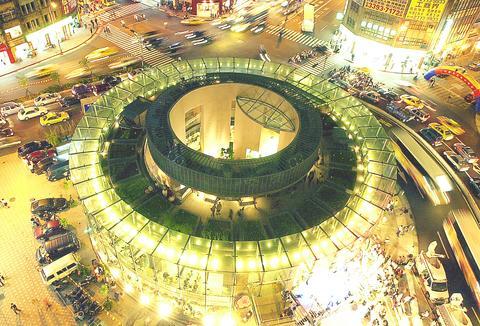After 17 months of reconstruction, the 93-year-old Chien-Cheng Circle food market in Taipei's Tatung District reopened yesterday evening.
Due to the two devastating conflagrations in 1993 and 1999, Taipei City Government decided in March 2001 to revitalize the time-honored food market. Taipei Mayor Ma Ying-jeou (馬英九) ordered the demolition of the Chien-Cheng Circle and announced that its reconstruction was one of the projects aiming to revitalize Taipei's older districts.
The reconstruction cost the city government about NT$160 million in construction and NT$50 million in compensation for old vendors residing in the former building.

PHOTO: SEAN CHAO, TAIPEI TIMES
Located at the intersection of Chungching North Road, Nanking West Road and other four arteries, the Chien-Cheng Circle has been part of the collective memory of many Taipei citizens as well as international visitors because of the Taiwanese delicacies available there all night.
Dubbing the opening of the new circle as "the reappearance of Taipei's halo," the city government yesterday gave away 700 food-tasting coupons of NT$100 each and organized a tour of the historical building.
The tour was led by Chuang Yung-ming (莊永明), who is a vice chairman of the municipal historical research department and also a professor at Taipei Medical University.
Branded Taipei's new delicacies landmark, the brand new Chien-Cheng Circle is a cylindrical two-story glass building accommodating 20 food-vending booths, as well as a performing arts center on the top of the building.
Designed on the theme "the circle of life," the architect Lee Tsu-yuan (李祖原), a nationally distinguished architect who also designed the Taipei MRT's Hsintien Depot, said that he wanted to let people enjoy traditional fare in a modern building, attracting both old and young customers.
Blooming since the Japanese colonial era, the Chien-Cheng Circle was the most bustling and popular night market in northern Taiwan.
In its heyday during the 1960s and 1970s, there were about 100 booths selling popular Taiwanese snacks such as glutinous rice dumplings, oyster omelettes, fish ball noodles, unfried spring rolls and other delicacies.
During the reconstruction, the engineering team unearthed a reservoir from the center of the circle which was constructed by Japanese soldiers during World War II.
The city government has announced the reservoir as the 105th historic spot in Taipei.
Huang Jung-feng (
"It is Taipei's pride," Huang said.

SHIPS, TRAINS AND AUTOMOBILES: The ministry has announced changes to varied transportation industries taking effect soon, with a number of effects for passengers Beginning next month, the post office is canceling signature upon delivery and written inquiry services for international registered small packets in accordance with the new policy of the Universal Postal Union, the Ministry of Transportation and Communications said yesterday. The new policy does not apply to packets that are to be delivered to China, the ministry said. Senders of international registered small packets would receive a NT$10 rebate on postage if the packets are sent from Jan. 1 to March 31, it added. The ministry said that three other policies are also scheduled to take effect next month. International cruise ship operators

NUMBERS IMBALANCE: More than 4 million Taiwanese have visited China this year, while only about half a million Chinese have visited here Beijing has yet to respond to Taiwan’s requests for negotiation over matters related to the recovery of cross-strait tourism, the Tourism Administration said yesterday. Taiwan’s tourism authority issued the statement after Chinese-language daily the China Times reported yesterday that the government’s policy of banning group tours to China does not stop Taiwanese from visiting the country. As of October, more than 4.2 million had traveled to China this year, exceeding last year. Beijing estimated the number of Taiwanese tourists in China could reach 4.5 million this year. By contrast, only 500,000 Chinese tourists are expected in Taiwan, the report said. The report

HORROR STORIES: One victim recounted not realizing they had been stabbed and seeing people bleeding, while another recalled breaking down in tears after fleeing A man on Friday died after he tried to fight the knife-wielding suspect who went on a stabbing spree near two of Taipei’s busiest metro stations, Taipei Mayor Chiang Wan-an (蔣萬安) said. The 57-year-old man, identified by his family name, Yu (余), encountered the suspect at Exit M7 of Taipei Main Station and immediately tried to stop him, but was fatally wounded and later died, Chiang said, calling the incident “heartbreaking.” Yu’s family would receive at least NT$5 million (US$158,584) in compensation through the Taipei Rapid Transit Corp’s (TRTC) insurance coverage, he said after convening an emergency security response meeting yesterday morning. National

The Forestry and Nature Conservation Agency yesterday launched a gift box to market honey “certified by a Formosan black bear” in appreciation of a beekeeper’s amicable interaction with a honey-thieving bear. Beekeeper Chih Ming-chen (池明鎮) in January inspected his bee farm in Hualien County’s Jhuosi Township (卓溪) and found that more than 20 beehives had been destroyed and many hives were eaten, with bear droppings and paw prints near the destroyed hives, the agency said. Chih returned to the farm to move the remaining beehives away that evening when he encountered a Formosan black bear only 20m away, the agency said. The bear